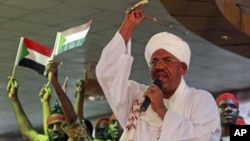Sudanese President Omar al-Bashir has announced a series of deep budget cuts while addressing the National Assembly in Khartoum Monday. He said his government is eliminating the positions of deputy ministers, senior advisers and top offiicals from the current Cabinet.
Last week Sudan’s Finance Minister Ali Mahmoud said the austerity measures taken by his government is an indication of bankruptcy in the country. He made the comments during an emergency parliamentary session to discuss the economic crisis in Sudan.
Sudan’s economy has been struggling with soaring inflation and depreciation of Sudanese pounds since South Sudan’s independence in July of last year. Sudan's inflation rate rose to 30 percent early this month as the Sudanese pounds hit new lows in the black market.
A group of opposition political parties known as the Alliance of Sudan Opposition Parties said the government of President Omar al-Bashir is not paying attention to economic crisis. Senior member of the alliance Sadiq Yousif said the current situation can only be resolved if the government agrees to resume oil trade between with South Sudan.
The country lost 75 percent of its oil revenues after South Sudan declared independence in July of last year and Juba’s decision to shut down its oil pipelines in January of this year. The oil shutdown devastated both Sudan’s and South Sudan’s economies. Yousif said the situation can be resolved if the government of President Bashir cuts down on its spending on the war in Darfur, Southern Kordofan and Blue States. He said Sudan has no other functioning sources of revenue.
"The revenue from oil is stopped; the second thing the government is [doing is] continuing to wage war against its people in Darfur, Blue Nile and Southern Kordofan. And the government itself says that the war costs about four million dollar per day," he added.
The senior member of the Sudan Communist Party criticized the government’s attempts to increase taxes on fuel and food. He said any move by the government in the wrong direction will hurt the Sudanese people. Yousif insisted that the solution to the current crisis is through dialogue with South Sudan.
"There is no solution for the government except to come to an agreement with the South [Sudan] about transporting oil," he said. "The second thing is to stop the war [and the] third thing is to stop the extravagancy in the government because the government apparatus itself observe [consumes] more than 60 percent of the budget of the Sudan government."
He said the opposition political parties have no other option but to stop the government from increasing prices or they will work to overthrow the government of President Bashir. There were street protests over high prices in several cities across the country.
Former Sudanese President Gaafar Mohammed Nimeiry was overthrown in 1985 by two weeks of street protests because of high food prices and hyperinflation of 80 percent. Sadiq Yousif said Sudan may soon witness the same scenario if things don’t change.
Last week Sudan’s Finance Minister Ali Mahmoud said the austerity measures taken by his government is an indication of bankruptcy in the country. He made the comments during an emergency parliamentary session to discuss the economic crisis in Sudan.
Sudan’s economy has been struggling with soaring inflation and depreciation of Sudanese pounds since South Sudan’s independence in July of last year. Sudan's inflation rate rose to 30 percent early this month as the Sudanese pounds hit new lows in the black market.
A group of opposition political parties known as the Alliance of Sudan Opposition Parties said the government of President Omar al-Bashir is not paying attention to economic crisis. Senior member of the alliance Sadiq Yousif said the current situation can only be resolved if the government agrees to resume oil trade between with South Sudan.
The country lost 75 percent of its oil revenues after South Sudan declared independence in July of last year and Juba’s decision to shut down its oil pipelines in January of this year. The oil shutdown devastated both Sudan’s and South Sudan’s economies. Yousif said the situation can be resolved if the government of President Bashir cuts down on its spending on the war in Darfur, Southern Kordofan and Blue States. He said Sudan has no other functioning sources of revenue.
"The revenue from oil is stopped; the second thing the government is [doing is] continuing to wage war against its people in Darfur, Blue Nile and Southern Kordofan. And the government itself says that the war costs about four million dollar per day," he added.
The senior member of the Sudan Communist Party criticized the government’s attempts to increase taxes on fuel and food. He said any move by the government in the wrong direction will hurt the Sudanese people. Yousif insisted that the solution to the current crisis is through dialogue with South Sudan.
"There is no solution for the government except to come to an agreement with the South [Sudan] about transporting oil," he said. "The second thing is to stop the war [and the] third thing is to stop the extravagancy in the government because the government apparatus itself observe [consumes] more than 60 percent of the budget of the Sudan government."
He said the opposition political parties have no other option but to stop the government from increasing prices or they will work to overthrow the government of President Bashir. There were street protests over high prices in several cities across the country.
Former Sudanese President Gaafar Mohammed Nimeiry was overthrown in 1985 by two weeks of street protests because of high food prices and hyperinflation of 80 percent. Sadiq Yousif said Sudan may soon witness the same scenario if things don’t change.






